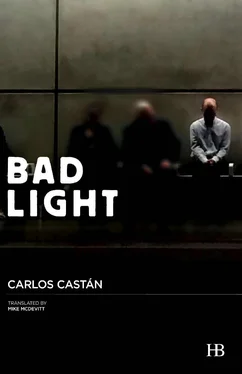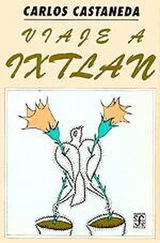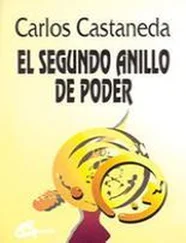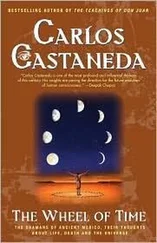Carlos Castán - Bad Light
Здесь есть возможность читать онлайн «Carlos Castán - Bad Light» весь текст электронной книги совершенно бесплатно (целиком полную версию без сокращений). В некоторых случаях можно слушать аудио, скачать через торрент в формате fb2 и присутствует краткое содержание. Год выпуска: 2016, Издательство: Hispabooks, Жанр: Современная проза, на английском языке. Описание произведения, (предисловие) а так же отзывы посетителей доступны на портале библиотеки ЛибКат.
- Название:Bad Light
- Автор:
- Издательство:Hispabooks
- Жанр:
- Год:2016
- ISBN:нет данных
- Рейтинг книги:5 / 5. Голосов: 1
-
Избранное:Добавить в избранное
- Отзывы:
-
Ваша оценка:
- 100
- 1
- 2
- 3
- 4
- 5
Bad Light: краткое содержание, описание и аннотация
Предлагаем к чтению аннотацию, описание, краткое содержание или предисловие (зависит от того, что написал сам автор книги «Bad Light»). Если вы не нашли необходимую информацию о книге — напишите в комментариях, мы постараемся отыскать её.
Carlos Castán
Bad Light
Bad Light — читать онлайн бесплатно полную книгу (весь текст) целиком
Ниже представлен текст книги, разбитый по страницам. Система сохранения места последней прочитанной страницы, позволяет с удобством читать онлайн бесплатно книгу «Bad Light», без необходимости каждый раз заново искать на чём Вы остановились. Поставьте закладку, и сможете в любой момент перейти на страницу, на которой закончили чтение.
Интервал:
Закладка:
Yet there is a dark pleasure to be had in setting fire to ships and watching as any hope of return goes up in flames on the water, a mile from the shore. Once the thought has crossed your mind, it’s hard to resist the temptation to make a clean break, the longing to give in to the black vortex that seeks to swallow you whole from inside an abyss, like a giant claw grabbing you by the ankles and dragging you in; it’s tough to give up on the idea of cutting the ropes and turning off the lights, unplugging everything so that all that remains is to toss portraits, bouquets, and ashes overboard. You know you shouldn’t yet are powerless to do otherwise. Just like when, as a child, you strike a younger brother just because you feel like it, or dump the girl of your dreams for no reason she or anyone else can grasp, leaving her, just like that, weeping on a park bench.
A few days after having officially left, I had to return to my former apartment to fetch a few of my belongings when I spotted a pair of my shoes — dirty, somewhat the worse for wear, in need of a lick of polish — lying forlornly on the bedroom floor. For some obscure reason, a pair of shoes always makes my thoughts turn to death. At some point in my childhood, perhaps not as hazy in my nightmares as I might like to think in my waking hours, I must have been taken aback on entering the room of a dead relative, one of those distant family members who would pass away in provinces as lost as they themselves were, forcing me to travel all night long and miss a day of school among the cypresses, the black-clad women brewing endless pots of coffee, and all manner of friends and in-laws trying on the deceased man’s overcoats for size, almost out of eyeshot. And I’d swear that after the funeral, I spotted a pair of black shoes on the floor and understood death on sensing, for the very first time, the absence of any legs rising up toward the bedroom ceiling, forming a human being along the way, with his gestures and his white shirt; the void left behind by the dead man was right there, in the air above the shoes. And, stricken with horror, I also sensed the prospect of widowed footsteps roaming the hallways in the nights to come. The shoes lay a few short yards from the bed that, though it might now smell only of fever, and though pictures of the Virgin Mary had been pinned to the headboard, had no doubt in the not too distant past been privy to laughter and desire — the door locked from the inside entirely by design and the children horsing around on the other side of it, hovering dangerously close, the sweet fear of being caught in the act, the mischief of urgent lovemaking. I knew, as soon as I clapped eyes on those discarded shoes of mine, that I was a dead man in that house. In other words, it was as if between those four walls there languished a ghost whose facelessness was precisely my facelessness. The sight of that footwear tipped the balance more than the sight of empty closets with bare coat hangers, barren drawers, or bookshelves covered in nothing but dust. In Auschwitz, so Jacobo had taught me, shoes were piled up at the entrance and can still be seen in the camp quarters that now house a museum. A huge heap of loafers, boots of all types and sizes, children’s sandals. Contemplating that colossal pile, you think of the barbarity, of numbers and facts and the horror of history, of the pajama-clad skeletons filing past in black and white that we’ve seen in so many documentaries, all those trains screeching to a halt at the gates to hell; but if you pause awhile to observe one single item of footwear, one shoe in particular or a pair tethered together by a knot, then you see the dead child. You see a boy struggling to tie the laces in order to keep the boot from falling off with every step he takes or from swallowing up his socks. You picture him seated on the ground, tugging firmly on the tongue of his shoe, you see his snot, you hear his breathing, the sound of his lungs compressing the frozen air of a Polish winter. Just as I saw myself in that apartment. When I closed the door behind me, the shoes stayed where they were, empty forevermore, foolish, bereft, filled with air getting staler with each passing minute. My life, from that moment onward, was something else, something hard to pin down, the exploits of a being who moved outside of myself, and barefoot. At that moment, my mood was abject. The streets, the world, any room in which I might find myself, had become pure exposed terrain.
I’ve had that same sense of my own death on returning to cities or neighborhoods from my past, any of the places from which I’d vanished without a trace and which have carried on regardless, the everyday hustle and bustle, bars that change owners, stores that shut down, streets that are widened, neon signs where before there was nothing. It’s no stretch to see yourself as a ghost among neighbors who no longer recognize you, the handful of storekeepers who remain behind their counters, affable and grown old as if by magic, the groups of kids who appear out of nowhere, making their way home from school amid a clamor of shouts and snacks wrapped in tinfoil and soccer balls and schoolbooks with homework for the following day, the clusters of women chatting on the sidewalk, and the pitiful cries of the lottery vendors. That pair of shoes lying on the floor brought home the fact that, for all intents and purposes, I had just died for many people. Without the grieving of others, without the slightest ritual, but with the exact same outcome of dark solitude and absence stretching out as far as the eye could see. My thoughts turned to the names of all those I would never again see, save some freak occurrence, all those individuals who, without my ever having been truly close to them, had nevertheless formed the human backdrop against which my days unfolded. Without the spotlight of their gaze on me, everything took on a nightmarish air. What becomes of a life when no one is watching anymore, aside from a nonentity who comes and goes, eats dinner or doesn’t, squirms or laughs? If, when all is said and done, every life is a story, then every story needs a reader. Otherwise, the world around us runs the risk of fading to nothing, leaving behind nothing more than disjointed perceptions, moments like islands, brief snatches. True destitution arises when we exit the stage and the eyes that followed our movements vanish or explode or simply take to the air like tiny balloons fleeing to the skies of other worlds. Certain parallels can be drawn between the newly abandoned and that classmate orphaned in primary school with whom we all wished to share part of our sandwiches during recess, trying to make sure he was not left all alone with his thoughts in the corner: the un-ironed shirt, the gaze perpetually lost in the distance, and that almost imperceptible dampness pooled in the corners of the eyes. But at least he had a star on which to gaze at night from his bedroom, or so he said, and that same star watched over his footsteps and sometimes even quizzed him on the lesson of the following day. For the one who’s been jilted, instead, the blackness of the sky is filled only with closed eyelids. A vast drawn curtain. When the mannequin is moved from the shop window to the storeroom in the far end of the basement, it matters little what clothes it’s wearing, whether or not it’s broken, whether or not it still trembles.
From Paris, at a distance of so many miles, I was seeking to get a clear view, from another vantage point, of the recent events in my life and the state of mind in which I found myself, while trying, as far as possible, to put things back in some sort of order. I had just moved into a tenthfloor apartment from which I could see the towers on the Cathedral of Our Lady of Pilar and one or two other high-rises that gave the city skyline a Mudejar air. A welcoming spot, with plenty of wood, just as I’ve always liked, plaster bas-reliefs even in the bathroom, and festooned with Japanese ornaments, prints, and plates with painted birds hanging on the walls. The street was on a slope, and the city buses hurtled by, heading downhill to the center of town or skidding alarmingly to a halt in front of the bus shelter that stood on the opposite sidewalk. Sometimes, at night, the noise got mixed up in my slumbers with the sound of a cliff top suddenly crumbling. The bedding and the table linen were the most characterful items in that apartment, everything as if from a bygone age, as if stolen from an imaginary museum dedicated to my childhood. A female friend who dropped by from time to time back then to spice up my siestas a little bought me a new set of bedsheets—“I sleep in this bed of yours and I feel like my own mother or something. I can’t fuck like this.” Though I began using the sheets she had brought, in deference to her, the others were more to my liking. I explained to her that even in Barcelona, most apartments are like this on the inside, I’d seen them. Later, you’d spot their occupants out and about, sporting their designer gear, wearing those gray shirts or riding their bikes, a Nike backpack or a leather bag slung over their shoulders. Which is all well and good, but their apartments are just like this on the inside. Most are, anyway. Flick any switch, and desolation lights up on the ceiling. On the six-bulb chandeliers, two or three bulbs at most work, and they give off a light so yellowish and washed out it’s almost enough to make you wish you were dead, if only so as not to belong, as though you were just one more item among all the others, to the collection of things surrounding you, all taking up a certain volume of air, just like you — everything: crochet circles, porcelain objects, faded towels folded in two in the top drawer of a closet that doesn’t quite close right.
Читать дальшеИнтервал:
Закладка:
Похожие книги на «Bad Light»
Представляем Вашему вниманию похожие книги на «Bad Light» списком для выбора. Мы отобрали схожую по названию и смыслу литературу в надежде предоставить читателям больше вариантов отыскать новые, интересные, ещё непрочитанные произведения.
Обсуждение, отзывы о книге «Bad Light» и просто собственные мнения читателей. Оставьте ваши комментарии, напишите, что Вы думаете о произведении, его смысле или главных героях. Укажите что конкретно понравилось, а что нет, и почему Вы так считаете.












